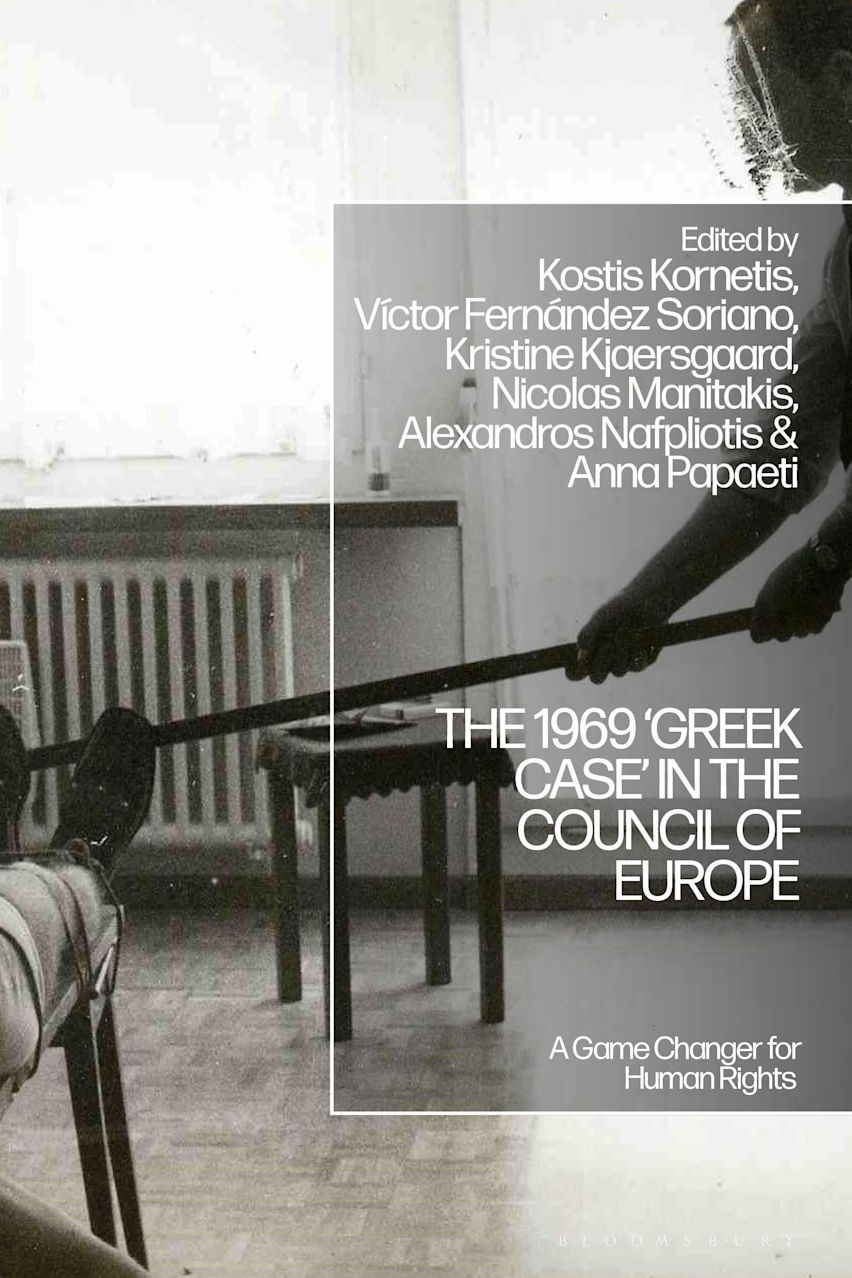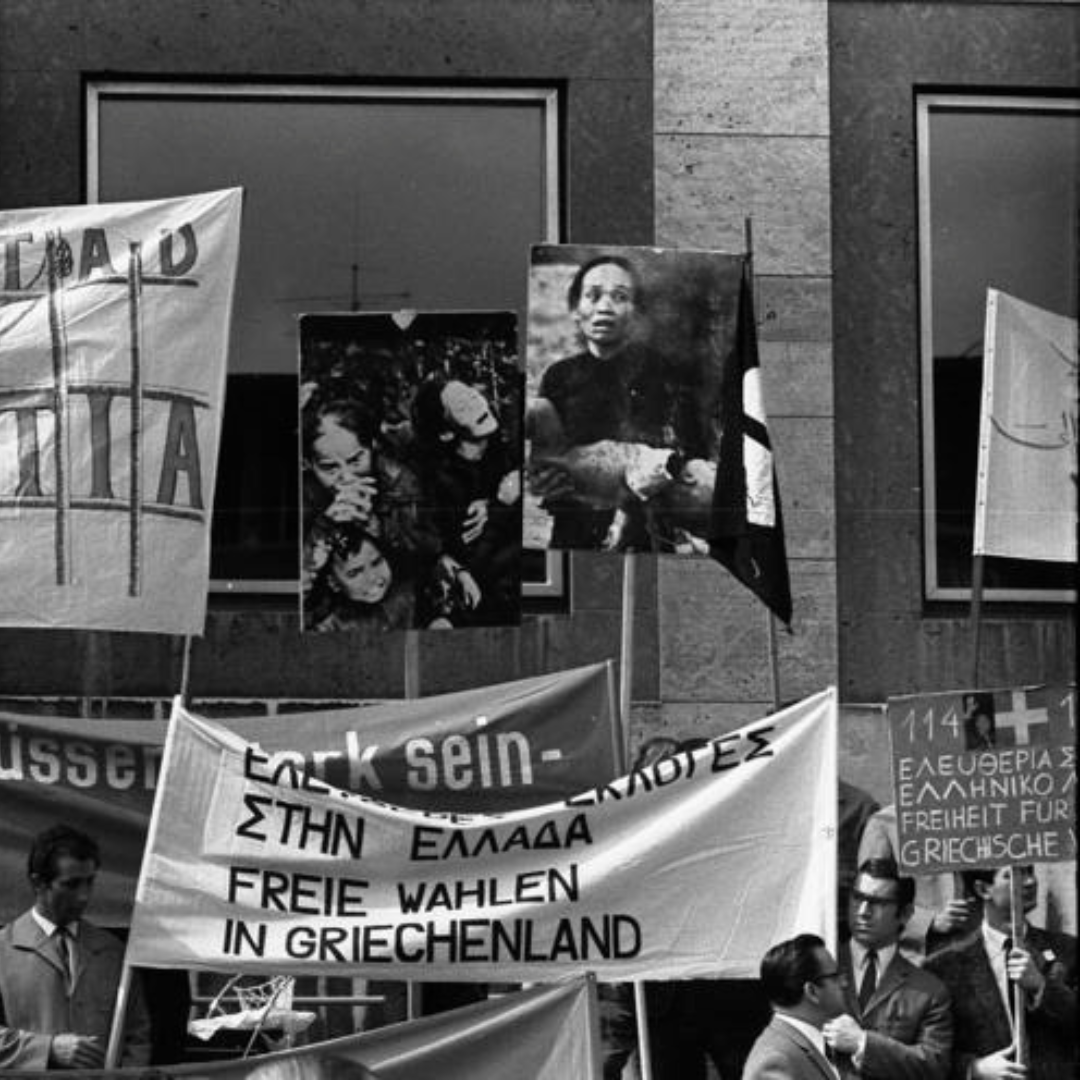The "Greek case", the Council of Europe, and international human rights

Published by: Bloomsbury

When specific historical moments occur, we cannot forecast their future impact, thus questioning the need to record them. However, the cyclical path of history can bring them under the spotlight again. The researcher then becomes responsible for handling them, extracting their details and presenting them to the public. Such is the history of human rights. In a world that has entered a period of rapid democratic backsliding, it is significant to learn and remember how previous generations stood against human rights restrictions, in particular when this relates to the positions of specific institutions and people’s lived experiences.
The 1970s echoed a new era where values and human rights were at the core of democratisation, especially in the West. However, democratic backsliding was still dangerous for democracies, particularly when in the service of the policies of the USA. Perhaps the most characteristic example of the period was the junta regime in Greece. Although numerous researchers have studied the topic over the decades, and from almost every aspect, the impact of human rights on the junta’s international image was sidelined until recently. The current volume attempts to fill this gap. A six-member editorial team draws from a specific historical event – the 1969 “Greek Case” in the Council of Europe – and attempts to underline its significance as a “game changer”. However, their aim is dual: the volume’s title refers not only to human rights, but also to the junta’s image across Europe.
The volume consists of five parts and 20 chapters, covering applicant states’ human rights policies against the junta, the Greek Case’s international impact, anti-junta resistance, the role of international institutions and solidarity movements, and the link between torture, terror, and testimony. Such an enormous range makes it a challenge to successfully balance peoples’ narratives, the policies of European states, and the positions of international institutions and movements without losing sight of the book’s initial aim.
After briefly describing the examined event in the introduction, the first part introduces us to the role of the so-called “applicant states” in internationalising their rejection of the junta’s anti-human rights policies. The authors write about their countries (Scandinavia, the Netherlands, and Denmark), offering an in-depth understanding of the various levels of political negotiations while attempting to create a standard political line to confront the junta. Their emphasis is directed to the common heritage of moral duty that characterises the Nordics – broadly meaning Sweden, Norway, Finland, and Denmark – and their differentiation from the rest of Europe. Moreover, the case of the Netherlands made visible how micro- and macro-politics could clash and trigger social frustration when what is at stake has an international impact. We are thus observing the backstages of a rich history of political negotiations, diplomacy, the USA’s rejections, and the first glimpses of what could be the core of the EU after 1990: the respect for and protection of human rights.
The second part of the volume deals with the international impact of the Greek Case. Researchers present the role of the Council of Europe – the main protagonist of the volume – in connection with the policies of West Germany, Italy and the European Community. Selecting these cases offers a broader overview of how significant players at the core of the European Community reacted to the Greek problem. It introduces us to the fluid political scene of Germany, just before Social Democrats won the elections, and brings it under the spotlight in Italy, as the country had close relations with the junta, offering free space for the activity of anti-democratic groups. The focus on the European Community allows us to understand better the challenges that arose until the European Union was created. The chapter on Francoist Spain is one of the most challenging of this volume, as it imprints how one Mediterranean dictatorship viewed another Mediterranean dictatorship, the manipulation of the Greek Case by Francoist Spain, and its presentation in the pro- and anti-regime newspapers in Spain.
Stories about espionage networks, and life-threatening witnesses, due to pro-junta spies, sketched the road that led to Greece’s exit from the Council of Europe.
The macro-level (international context) is in open interaction with the micro-level (citizens’ narratives, civic mobilisation), as the third part focuses on the anti-junta resistance. Specifically, it approaches the Greek Case as part of a global scene shaped by the Cold War. The era is better shaped in the following two chapters, as the discussion is directed to “the battle of witnesses” and the impact the Greek Case had on the development of anti-dictatorial activism. What is described as “the battle of witnesses” refers to diplomatic actions and backstage clashes, which involved the junta regime, Greek anti-dictatorship activists and foreign pro-democracy supporters. Stories about espionage networks, and life-threatening witnesses, due to pro-junta spies, sketched the road that led to Greece’s exit from the Council of Europe. Discussing anti-dictatorial networks in Europe allows us to observe society’s role in pushing for anti-junta political decisions. Networks were numerous, with active links with each other and, despite their ideological differences, they succeeded in presenting the Greek Case across Europe.
This chapter prepares us for the next part, focusing on international institutions and solidarity movements. Here, the history and the role of Amnesty International in the Greek Crisis are presented, as it is now acknowledged that a newborn organisation, such as Amnesty International, had a core role in revealing the situation in Greece. The era the volume covers was deeply affected by the rise of human rights, peace movements and the anti-war movement, mainly due to the Vietnam war. The abolition of democracy abolition in Greece therefore triggered solidarity movements due to Greece’s history of democracy. Nalbadidacis’ chapter offers an inside view of the situation from the Council of Europe, highlighting the case’s challenges. The chapter deals with transnationalism – “activists without borders” – regarding campaigning about the Greek Case before the country left the Council of Europe. The last chapter in this part works as a bridge for the volume’s final part by drawing lines to the Argentinian junta. The 1970s was a period when democracy was also abolished in Argentina by the army, followed by numerous tortures and murders of anti-dictatorship activists, creating a pattern familiar to the Greek one.
The topics of torture, terror, and testimony are covered in the volume’s last part. This part is rich in interviews with former victims and lawyers and uses sociological and feminist studies to approach its subjects. Torture creates trauma and is approached through the stories of women victims of the junta regime. After helping them reveal their stories, the chapter follows them on the reconstruction of their relationships with their torturers until they regain their bodies and psychological freedom. Moreover, there is a recognition of how the “Greek Case” offered the necessary materials to the international community to define torture for international agreements. Discussing torture and human rights during the Greek junta is only half the story if no reference is made to the notorious “EAT/ESA” prisons and the impact judicial trials had on finally defining the form of the torture and what kind of trauma it created. The research ends with a biography-like chapter and an interview covering the memories of the American lawyer James Becket of the examined topic and his late wife’s fight against the junta.
The editors succeed in combining transnational studies with a specific moment in time, acknowledging its impact at the micro and macro level.
Considering the volume’s topic, its content is cohesive as it draws – and strictly keeps – a line from the junta’s first days to Greece leaving the Council of Europe. The editors succeed in combining transnational studies with a specific moment in time, acknowledging its impact at the micro and macro level. The existing gap in the literature is carefully approached with material not only from Greece but also about Greece from other countries of the Council of Europe. Most of the chapters on other European countries were written by a native expert of the country, allowing us to combine such events with the thoughts of Greek experts.
The volume offers in-depth ideas about diplomacy during the Cold War, political negotiations, and hesitations. Living at the dawn of a new era based on human rights, the volume’s actors present us with glimpses of their future policies and—without knowing it—shape the core of the future EU, as they promote the Council of Europe’s significance instead of their interests. The editors have seized upon a superficially small topic and presented its multiple aspects and impact from every side.
The volume serves a dual aim: it recreates the era’s atmosphere and helps us understand what was at stake as well as the Council of Europe’s position against the Greek junta. It enables us to draw parallels with today. The impact of the Greek Case deeply affected the shape of human rights during the examined era. Moreover, it boosted the prestige of international organisations, like Amnesty International, and the dynamic of solidarity movements. Considering this dense framework, the examined moment in time left its imprint on the development of European integration.
Even though the volume draws comparisons only with the Argentinian case, we can apply its content to similar contexts, such as the prerequisites that the EU seeks from potential new member-states. All this has happened due to this milestone, and more cases can be approached with a similar strategy. Whilst offering the “know-how” to approach topics as delicate as torture and trauma, the volume’s significance lies in its publication in an era of increased democratic backsliding. A new generation could be attracted by and learn from the battles of previous generations.
George Kordas is a PhD candidate in the Department of Political Science and History at Panteion University of Social and Political Sciences and an associate at its Centre for Political Research. His research focuses on the comparative study of the far right in Southeastern Europe and the study of the far-right’s subcultures. In his PhD project, he uses qualitative methods to investigate how the discourse of European Parliament members affects European values during the migration and refugee crisis. He has published chapters in international volumes, an article, and several book reviews and review essays in Greek and international journals.
